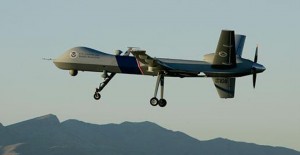Special to WorldTribune.com
CAIRO — The United States has resumed its air strike campaign
against Al Qaida in Yemen.
Officials said the U.S. military and intelligence community has
intensified strikes by unmanned aerial vehicles in Yemen. They said
U.S.-origin Predator UAVs were attacking suspected Al Qaida targets on a
daily basis in southern provinces.

“The air strikes are the result of close cooperation between the two
countries,” an official said.
Earlier this month, at least 20 Al Qaida fighters were killed in such
provinces as Abyan, Hadramout and Maareb. On Aug. 7, officials said seven Al Qaida fighters were killed in an air strike in the Baida province.
The casualties were said to have included Abu Osama Al Maarebi, deemed the most dangerous Al Qaida operative in Baida. Another target was identified as Abdullah Awad Al Masri, said to have been a leading explosive expert for Al Qaida in the Arabian Peninsula.
Officials said Al Qaida was using a range of Arab foreign nationals.
They cited fighters from Bahrain, Egypt, Iraq, Tunisia and Yemen.
The renewal of UAV operations came amid warnings by Yemen that AQAP was
renewing attacks in the south. In April, President Abbed Rabbo Mansour
Hadi signed an agreement that granted Washington greater authority to
conduct air strikes on suspected Al Qaida strongholds.
Washington plans to relay about $160 million in security aid over the
next few months. Officials said the assistance would help Yemen procure
aircraft and patrol boats for CI missions.
The Yemen Army has also resumed its offensive against AQAP. The Defense
Ministry said Army units and security forces stormed Al Qaida strongholds in
the Abyan town of Jaar.
The White House has been sending senior officials to maintain Yemen’s
commitment to U.S. security cooperation. The officials included U.S.
presidential security adviser John Brennan, who makes frequent trips to
Sanaa.
“In contrast to conventional wisdom, we see little evidence that
these actions generate anti-American feelings or encourage recruits to
AQAP,” Brennan said. “In fact, we see the opposite. Yemen is more eager to
work with us.”

You must be logged in to post a comment Login